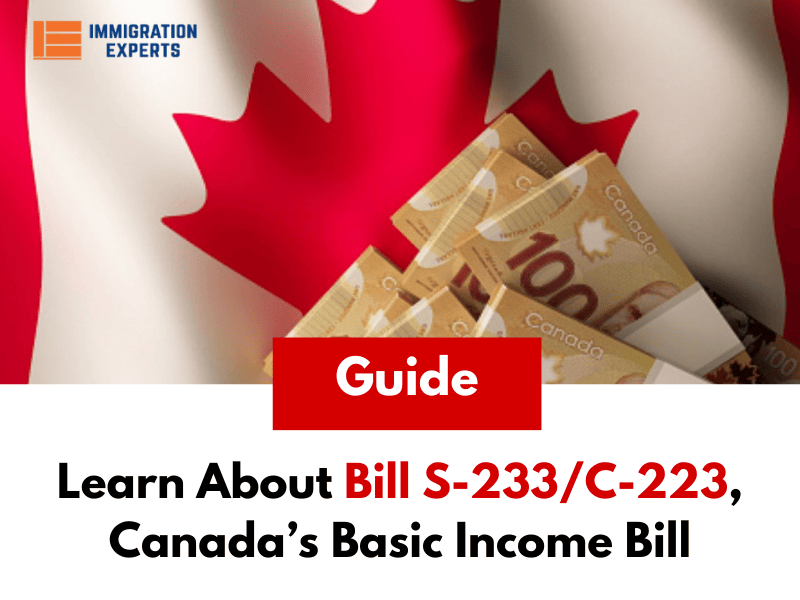051 8439995, 042 35911332

In the Senate (S-233) and House (C-223), there’s a plan called the Guaranteed Livable Income Bill. It wants to provide money for everyone in Canada to live on.
These bills ask the Canadian finance ministry to make a plan for giving money to all adults over 17 years old. This plan includes temporary workers, permanent residents, and refugee claimants, covering people across the country.
Parliament discussed the universal basic income bill on October 17. On the International Day for the Eradication of Poverty, this took place.
The bill, often called Universal Basic Income, is more accurately a Guaranteed Livable Basic Income bill. It aims to provide a secure income for all.
Things You Will Find In This Page
Universal Basic Income vs. Guaranteed Livable Income
The Difference Between Universal Basic Income and Guaranteed Livable Income:
Universal Basic Income (UBI) and Guaranteed Livable Income (GLI) are two approaches. Both provide financial support to individuals in a society, but they have some key differences.
- Recipients:
- UBI: Under UBI, every person in a society, regardless of their income level, receives a uniform monthly payment. This means that both the wealthy and the less fortunate get the same amount.
- GLI: In the GLI system, payments are made based on the financial needs of individuals or families. It is designed to support those with low incomes. It aims to help them escape poverty and maintain a decent standard of living.
- Funding:
- UBI: UBI is usually funded through the tax system, with the government collecting additional revenue at the end of the year from higher-income individuals who don’t need the UBI payment. It’s a way to redistribute wealth across the society.
- GLI: GLI, on the other hand, is more income-contingent. It targets those who require financial assistance to ensure they can live with dignity. The payments are aimed at reducing poverty and promoting self-sufficiency.
In essence, UBI provides the same amount to everyone, rich or poor, while GLI tailors the support to those who require it the most. Both systems have their merits and drawbacks, and the choice between them often depends on a society’s goals and values regarding income equality and poverty alleviation.

The proposed S-233/C-223 bill aims to establish a ‘National Framework for a Guaranteed Livable Basic Income Act’ in Canada. This framework is designed to provide every individual who is authorized to work in the country with a basic income that ensures a decent standard of living and the eradication of poverty. This includes various groups such as Canadian citizens, indigenous people, temporary workers, permanent residents, and refugee claimants.
Key provisions of this bill include:
- Defining Livable Basic Income: The bill suggests that there should be a national framework to determine what constitutes a livable basic income for each region in Canada. This takes into account the essential goods and services required for individuals to live a dignified and healthy life, as well as the cost of these goods and services in inaccessible markets.
- National Standards for Health and Social Supports: The bill also calls for the creation of national standards for health and social supports that work alongside a guaranteed basic income program. These standards would guide the implementation of the program in every province.
- No Work Requirement: Importantly, the bill specifies that to qualify for a guaranteed livable basic income, individuals should not be obligated to participate in education, training, or the labor market. This recognizes that such requirements can sometimes be barriers to accessing financial assistance.
- Protection of Exceptional Needs: The bill ensures that the implementation of a guaranteed livable basic income program should not lead to a reduction in services or benefits that are meant to address the unique needs of individuals related to health or disability.
This bill is focused on creating a comprehensive framework that ensures every person authorized to work in Canada has access to a basic income that allows for a decent and dignified life while addressing poverty. It considers regional variations in costs and emphasizes the importance of national standards for health and social support. Additionally, it removes requirements related to work or training for qualification and safeguards services for those with exceptional needs.
The Significance of the Guaranteed Livable Basic Income Bill
The Guaranteed Livable Basic Income Bill is important because it can help get rid of poverty and make sure everyone has enough money to live okay. It also wants to make things fair by giving more help to people who don’t have much money. This bill can also make it easier for people to get good healthcare and education. Not only that, it wants to help families and communities by making sure they have enough money to live without too much worry.
It looks out for the most vulnerable people in our society, like indigenous folks and refugees, making sure they’re taken care of. Plus, it knows we have big challenges, like the climate getting worse, so it wants to help us change our economy in a way that deals with these big problems.
If this program becomes a national thing, it will make sure that every Canadian feels respected, dignified, and safe.
Inauguration and Progress of the S-233 and C-223 Bills in 2021

These bills were first introduced in 2021, with Senator Kim Pate presenting S-233 in the Senate. The bill had its first reading on December 16, 2021, and its second reading on April 18, 2023. Currently, it is being reviewed by the Standing Senate Committee on National Finance, and the most recent meeting regarding this was on October 17, 2023. Additionally, Leah Gazan, a member of parliament representing Winnipeg Centre, introduced a similar bill in the House of Commons on December 16, 2021.
What is the Potential Amount for a Livable Basic Income?
The amount guaranteed in a basic livable income can vary depending on where you live in Canada because the cost of living differs from one place to another. No fixed income level represents poverty.
Nevertheless, experts have suggested that, in a general sense, a guaranteed basic income for a single person aged 18 to 64 in 2021 could be around $20,000 per year. This is the amount that advocates have discussed to provide a decent standard of living and help people meet their basic needs.
Guaranteed Basic Income (GBI)
The guaranteed basic income (GBI) is a financial support system where monthly payments are given to individuals and families with lower incomes without any specific conditions. In essence, it provides economic assistance to those in need.
It’s important to note that programs like the Canada Emergency Response Benefit (CERB) introduced during the pandemic were not considered true basic income programs. The CERB had specific requirements, such as applicants needing to have earned at least $5,000 in the previous year to be eligible. This is different from the GBI, which typically provides financial assistance without such conditions.
